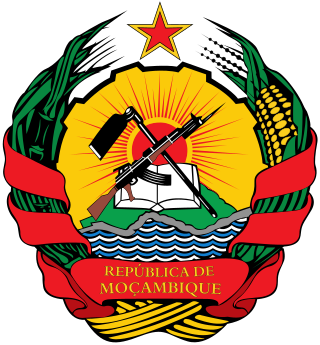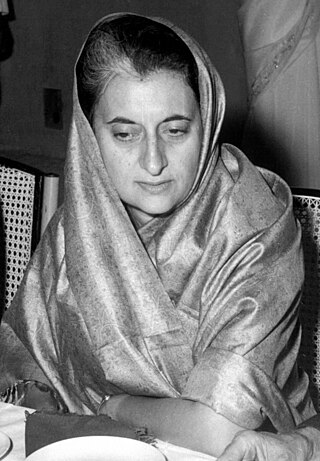
Politics in Mozambique takes place in a framework of a semi-presidential representative democratic republic, whereby the President of Mozambique is head of state and head of government in a multi-party system. Executive power is exercised by the government. Legislative power is vested in both the government and the Assembly of the Republic.
The politics of Tanzania takes place in a framework of a unitary presidential democratic republic, whereby the President of Tanzania is both head of state and head of government, and of a multi-party system. Executive power is exercised by the government. Legislative power is vested in both the government and parliament. The party system is dominated by the Chama Cha Mapinduzi. The Judiciary is independent of the executive and the legislature.

The Pan Africanist Congress of Azania, often shortened to the Pan Africanist Congress (PAC), is a South African pan-Africanist national liberation movement that is now a political party. It was founded by an Africanist group, led by Robert Sobukwe, that broke away from the African National Congress (ANC) in 1959, as the PAC objected to the ANC's theory that "the land belongs to all who live in it both white and black" and also rejected a multiracialist worldview, instead advocating a South Africa based on African nationalism.

General elections were held in India in four phases between 20 April and 10 May 2004. Over 670 million people were eligible to vote, electing 543 members of the 14th Lok Sabha. Seven states also held assembly elections to elect state governments. They were the first elections fully carried out with electronic voting machines.

The National Assembly is the directly elected house of the Parliament of South Africa, located in Cape Town, Western Cape. It consists of four hundred members who are elected every five years using a party-list proportional representation system where half of the members are elected proportionally from nine provincial lists and the remaining half from national lists so as to restore proportionality.

The Parliament of Eswatini is bicameral, consisting of a lower chamber and an upper one. Some of the members of both chambers are elected, while the rest are appointed by the King of Eswatini. Election is by secret ballot in a first-past-the-post system of voting. Members of both chambers serve for five-year terms. All candidates run on a non-partisan basis, as political parties are banned.

General elections were held in Singapore on 21 September 1963, five days after Singapore became part of Malaysia. Voters elected all 51 members of the Legislative Assembly. The elections were the only ones to date with no boundary changes to any existing constituencies prior to the elections. The result was a victory for the People's Action Party (PAP), which won 37 of the 51 seats, while the majority of the remaining seats were won by Barisan Sosialis (BS).

The Pan-Armenian National Movement or Armenian All-national Movement was a political party in Armenia.

Seif Sharif Hamad was a Tanzanian politician who served as the First Vice President of Zanzibar and as Party Chairman of ACT Wazalendo.
John Nyathi "Poks" Pokela was a South African political activist and Chairman of the Pan Africanist Congress (PAC).

General elections were held in India between 1 and 10 March 1971 to elect members of the fifth Lok Sabha. They were the fifth general elections since independence in 1947. The 27 Indian states and union territories were represented by 518 constituencies, each with a single seat. Under the leadership of Indira Gandhi, the Indian National Congress (R) led a campaign which focused on reducing poverty and won a landslide victory, overcoming a split in the party and regaining many of the seats lost in the previous election.

The Swaziland Progressive Party was the first political party founded in Swaziland.

The Republican Party of Georgia, commonly known as the Republicans, is a political party in Georgia active since 1978. Until March 2016, the party was a part of the Georgian Dream coalition that won the 2012 election, defeating the United National Movement. Currently it is in opposition to Georgian Dream as part of the Coalition for Change coalition.
This article covers the history of the Pan Africanist Congress of Azania, once a South African liberation movement and now a minor political party.

Parliamentary elections were held in Burkina Faso on 2 December 2012. They were the first elections held since the National Assembly dissolved the National Electoral Commission in 2011, following fraud allegations concerning the 2010 presidential elections. Municipal elections for over 18,000 councillors were held simultaneously. The elections were held amidst a period of political uncertainty, following protests against President Blaise Compaore's regime.
General elections were held in Tanzania on 25 October 2015. Voters elected the president, members of Parliament, and local government councillors. By convention, the election was held on the last Sunday of October and was supervised by the National Electoral Commission (NEC). Political campaigns commenced on 22 August and ceased a day before the elections.

General and local elections were held in Botswana on 24 October 2014. The result was an eleventh straight victory for the Botswana Democratic Party, which won 37 of the 57 elected seats. Incumbent president Ian Khama was sworn in for a second term on 28 October.
The Lesotho Liberation Army (LLA) was a guerrilla movement in Lesotho, formed in the mid-1970s and connected to the anti-Apartheid Azanian People's Liberation Army (APLA). It was the armed wing of the Basutoland Congress Party (BCP), a pan-Africanist and left-wing political party founded in 1952, which opposed the regime of Prime Minister Leabua Jonathan.

Presidential elections were held in Malawi on 23 June 2020, having originally been scheduled for 19 May and later 2 July. They followed the annulment of the results of the 2019 presidential elections, in which Peter Mutharika of the Democratic Progressive Party had received the most votes.
Mzwanele Nyhontso is a South African politician who is the president of the Pan Africanist Congress of Azania, and a member of the National Assembly of South Africa. Since July 2024 he is the Minister of Land Reform and Rural Development in the cabinet of the country's Government of National Unity.













